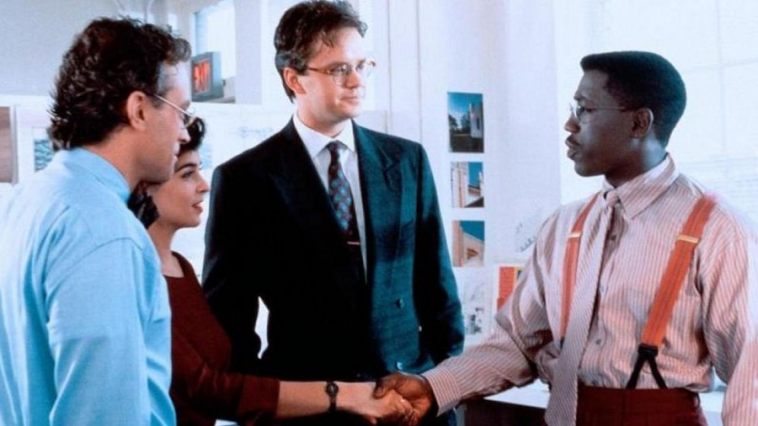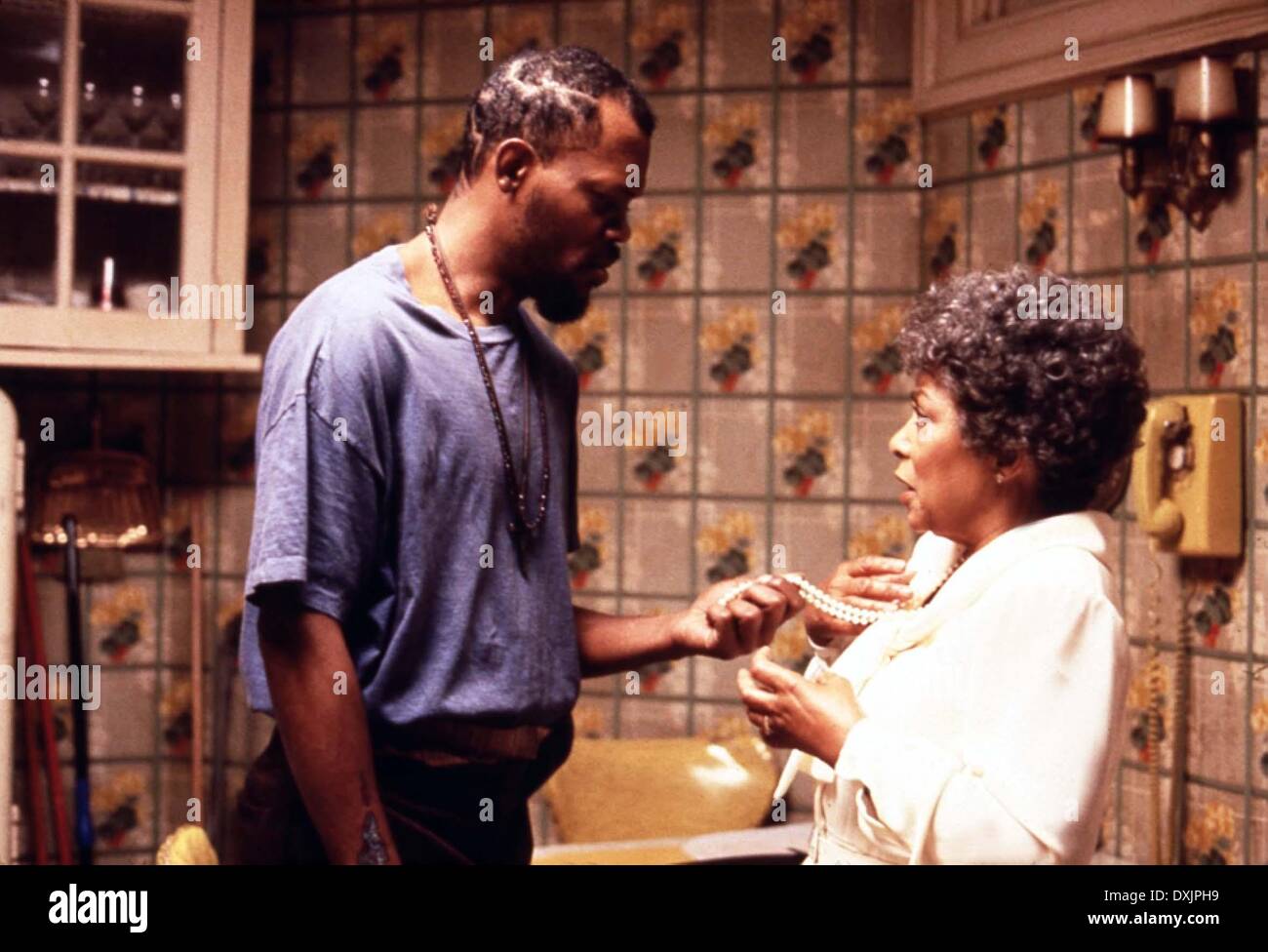← Back to Reviews
in
JUNGLE FEVER
Director Spike Lee gave us a real mixed bag with 1991's Jungle Fever, a well-meaning if overly elaborate look at New Millenium racism that does tread some new territory for mainstream films, but the primary story from which everything else springs just isn't as interesting as everything surrounding it.

The primary story revolves around Flip (Wesley Snipes), an intelligent and arrogant black architect who is married with a daughter and is so convinced that he is underappreciated where he works that he quits when his demand to be made partner isn't met. Angela (Annabella Sciorra) is a sexy Italian temp working for Flip who lives with her father, her two moronic brothers, and has a newsstand proprietor (John Turturro) in love with her. One fateful night, Flip and Angela give into a mutual attraction that they fought as long as they could, and the reveal of their affair alters the lives of everyone in their individual orbits forever.

Flip and Angela's affair springboards an in-your-face look at different kinds of racism that isn't always addressed in other films on the subject. This story is not just about a black guy cheating on his light-skinned black wife with a white girl. This is about an Italian girl being nearly beaten to death by her father when he learns his daughter is a "N****r lover." This is about black women's increasing insecurity regarding too many black men getting involved with white women. This is about how one of Angela's best friends finds her sleeping with a black man "disgusting". This about the newsstand proprietor who after being quietly dumped by Angie, finds himself attracted to a black woman and how his family is not having it.

There's also a slightly over the top, but nonetheless entertaining secondary story revolving around Flip's older brother, Gator (Samuel L. Jackson). Gator is a crackhead constantly borrowing money from Flip and his mother (Ruby Dee) and has been banned from his parents home by his father (Ossie Davis).

Though the film pretends to be a story of interracial romance, there's so much going on here that this so-called romance gets lost in the cinematic shuffle. Flip and Angela's story really doesn't sustain the interest as it should. First, because Sciorra's lifeless performance makes Flip's attraction to the woman hard to buy and the chemistry between Snipes and Sciorra just wasn't there and for a story like this, if there is no real chemistry between the leads, attention begins to wander. Fortunately, Lee gives us other things to distract us from the leads, particularly Gator's story, made completely watchable thanks to the flashy performance from Samuel L. Jackson, though the scene in the giant crack house strained credibility. The saddest part of Flip and Angela's story is that it really had very little to do with the color of their skin...these were just two people who had a moment of weakness that they mistook for love and paid the price for it.

Wesley Snipes works very hard at keeping Flip likable even though the guy is kind of an ass. Lonette McKee offers a powerhouse turn as Flip's wife and I loved Turturro (and his little brother Nicholas) and the scenery chewing turn by Oscar winner Anthony Quinn was also a standout.

Lee's self-indulgence soap box approach to direction has never been more apparent...that annoying camera thing where it looks like the characters are floating when they are supposed to be walking is used to distraction in two different scenes. And I don't know what it is about Spike and music, but there are few directors more clueless about music than Lee...it started off promisingly with Stevie Wonder's awesome title tune, but the music soon turned pretentious and overpowering, diluting the power of scenes that it should have been enhancing. Despite all this, I found myself riveted to the proceedings and never looked at my watch, though Lee has definitely done better work.
Director Spike Lee gave us a real mixed bag with 1991's Jungle Fever, a well-meaning if overly elaborate look at New Millenium racism that does tread some new territory for mainstream films, but the primary story from which everything else springs just isn't as interesting as everything surrounding it.

The primary story revolves around Flip (Wesley Snipes), an intelligent and arrogant black architect who is married with a daughter and is so convinced that he is underappreciated where he works that he quits when his demand to be made partner isn't met. Angela (Annabella Sciorra) is a sexy Italian temp working for Flip who lives with her father, her two moronic brothers, and has a newsstand proprietor (John Turturro) in love with her. One fateful night, Flip and Angela give into a mutual attraction that they fought as long as they could, and the reveal of their affair alters the lives of everyone in their individual orbits forever.

Flip and Angela's affair springboards an in-your-face look at different kinds of racism that isn't always addressed in other films on the subject. This story is not just about a black guy cheating on his light-skinned black wife with a white girl. This is about an Italian girl being nearly beaten to death by her father when he learns his daughter is a "N****r lover." This is about black women's increasing insecurity regarding too many black men getting involved with white women. This is about how one of Angela's best friends finds her sleeping with a black man "disgusting". This about the newsstand proprietor who after being quietly dumped by Angie, finds himself attracted to a black woman and how his family is not having it.

There's also a slightly over the top, but nonetheless entertaining secondary story revolving around Flip's older brother, Gator (Samuel L. Jackson). Gator is a crackhead constantly borrowing money from Flip and his mother (Ruby Dee) and has been banned from his parents home by his father (Ossie Davis).

Though the film pretends to be a story of interracial romance, there's so much going on here that this so-called romance gets lost in the cinematic shuffle. Flip and Angela's story really doesn't sustain the interest as it should. First, because Sciorra's lifeless performance makes Flip's attraction to the woman hard to buy and the chemistry between Snipes and Sciorra just wasn't there and for a story like this, if there is no real chemistry between the leads, attention begins to wander. Fortunately, Lee gives us other things to distract us from the leads, particularly Gator's story, made completely watchable thanks to the flashy performance from Samuel L. Jackson, though the scene in the giant crack house strained credibility. The saddest part of Flip and Angela's story is that it really had very little to do with the color of their skin...these were just two people who had a moment of weakness that they mistook for love and paid the price for it.

Wesley Snipes works very hard at keeping Flip likable even though the guy is kind of an ass. Lonette McKee offers a powerhouse turn as Flip's wife and I loved Turturro (and his little brother Nicholas) and the scenery chewing turn by Oscar winner Anthony Quinn was also a standout.

Lee's self-indulgence soap box approach to direction has never been more apparent...that annoying camera thing where it looks like the characters are floating when they are supposed to be walking is used to distraction in two different scenes. And I don't know what it is about Spike and music, but there are few directors more clueless about music than Lee...it started off promisingly with Stevie Wonder's awesome title tune, but the music soon turned pretentious and overpowering, diluting the power of scenes that it should have been enhancing. Despite all this, I found myself riveted to the proceedings and never looked at my watch, though Lee has definitely done better work.
